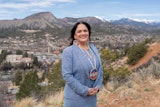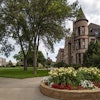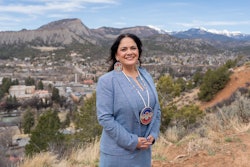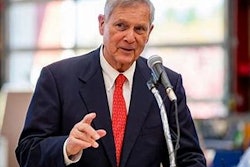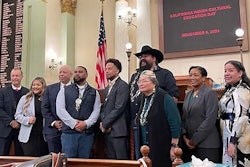Tribal College Advisory Board Holds First Meeting
WASHINGTON — Agendas were set and board members were sworn in as 13 of the 15 members of the President’s Advisory Board on Tribal Colleges and Universities gathered here in July for the group’s inaugural meeting.
Carrie L. Billy, executive director of the White House Initiative on Tribal Colleges and Universities, said the meeting gave board members an opportunity to bond and begin developing an agenda.
“It was the first time the members had an opportunity to interact and talk to each other,” she says.
U.S. Education Secretary Richard Riley delivered brief remarks at the meeting. Additionally, Assistant U.S. Education Secretary Patricia W. McNeil presided over a swearing-in ceremony of the board members during the daylong meeting.
Board members established committees in five areas: institutional sustainability, public-private partnerships, technology, facilities, and education system collaborations. Billy says the committees will commission reports in the five priority areas. The reports are likely to be presented at the next board meeting, which is expected to occur sometime in the fall, according to Billy.
An executive order signed by President Bill Clinton in 1996 established the board along with the tribal college initiative, which is based at the U.S. Department of Education. Under Executive Order 13021, the Board of Advisors on Tribal Colleges and Universities provides advice to the President and the Education Secretary on how federal agencies can improve access to federal resources and programs for the nation’s 31 tribal colleges and universities.
The board promotes access to high-quality education for economically disadvantaged students as well as the preservation and revitalization of American Indian and Alaska Native languages and cultural traditions. It also explores innovative approaches for linking tribal colleges with early childhood, elementary, and secondary education program.
Advisory board members are Alison R. Bernstein, Dr. Lionel Bordeaux, Dr. Tom Colonnese, Dr. Verna Fowler, Dr. Tommy Lewis Jr., Dr. Joe McDonald, Dr. Joseph Martin, Dr. Gerald “Carty” Monette, Debra Norris, Janine Pease-Pretty on Top, Anne C. Petersen, Faith Ruth Roessel, Dr. Karl Stauber, Richard Trudell, and Patrick Williams.
FBI Probing UDC Finances
WASHINGTON — The FBI is investigating charges of financial impropriety at the University of the District of Columbia, including rental payments from businesses with stores located on UDC properties, according to a story in The Washington Post.
As of Aug. 16, UDC’s president, Dr. Julius F. Nimmons Jr., had not been informed of the investigation. He also told The Post that he was unaware of any problems at the city’s only public institution of higher education that were serious enough to warrant an FBI probe.
But the newspaper reports that sources say FBI agents are questioning people who know about how UDC officials have handled school finances. And, they are asking about a variety of issues.
The probe is trying to determine whether the school mishandled the collection of rental payments from businesses that operate on its main campus on Connecticut Avenue in Northwest Washington. In one instance, no money at all was received from one business; and in other cases, only half the rent was ever marked on the books as being paid. Attorneys working for the university were notified, but nothing was resolved and the problem persists.
Investigators also are gathering information about a situation last year in UDC’s continuing education department, where teachers had not been paid regularly because funds meant for their salaries had been spent on other things (see Black Issues, Sept. 3, 1998).
And, the investigation is looking at questions dealing with some of the issues probed last year by the D.C. inspector general’s office concerning charges that tens of thousands of dollars were mishandled by UDC. One of those allegations concerned receipts from money collected in the UDC parking garage that did not match parking deposits made into a school account. Last month, a UDC employee was convicted of stealing $69,000 in parking revenue.
Nimmons says false allegations are being made about him and UDC by disgruntled employees, some of whom were being forced to leave the university as part of the effort to reinstate those wrongly fired three years ago (see Black Issues, Jan. 21, 1999).
“This is the beginning. It’s going to get uglier,” Nimmons says. “I’m telling you one thing. I’m here to stay and I’m going to do my job. The wannabes need to take note: I’m here to stay.”
New Poll Finds Young Americans Comfortable with Racial Separation
WASHINGTON — About half the young adults in a recent poll said racial separation in America is all right “as long as everyone has equal opportunity.”
The poll released last month by Hamilton College of Clinton, N.Y., found 50.3 percent of respondents said they strongly or somewhat agreed with the statement: “It’s OK if the races are basically separate from one another as long as everyone has equal opportunities.”
At the same time, 47.3 percent of those polled strongly or somewhat disagreed with the statement.
The poll, co-sponsored by the NAACP and Zogby International, surveyed 1,001 randomly selected people ages 18 to 29 over one week in April and had a margin of error of plus or minus 3 percentage points.
Among other poll findings:
Some 56 percent said the federal government should make sure Black people receive fair treatment in jobs.
About 57 percent agreed that generations of slavery and discrimination have created conditions that make it difficult for Blacks to work their way out of the lower class.
Some 54 percent said it was unlikely the United States would elect a Black president in the near future.
© Copyright 2005 by DiverseEducation.com
